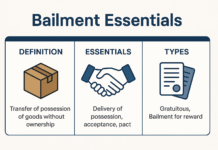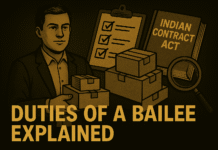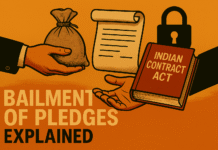What are the rights of the pawnee?
Rights of a Pawnee Under Indian Law: A Law Student’s Guide
When goods are pledged (given as security for a debt), the person receiving the goods (the pawnee) gains certain rights. Let’s explore these rights as defined under the Indian Contract Act, 1872.
1. Pawnee’s Right of Lien (Right to Retain)
The most fundamental right of a pawnee is the right to retain the pledged goods.
- Scope of Retention (Section 173): The pawnee can hold onto the pledged goods not just for the principal debt or the performance of the promise, but also for:
- The interest on the debt.
- All necessary expenses incurred by the pawnee for the possession or preservation of the pledged goods.
- Limitation on Retention (Section 174): Unless there’s a specific contract stating otherwise, the pawnee cannot retain the pledged goods for any other debt or promise beyond the one for which they were initially pledged.
- Presumption for Subsequent Advances: Interestingly, if the pawnee makes further advances to the pawnor, a contract to retain the goods for these subsequent advances is presumed, unless there’s an agreement to the contrary.
- Nature of Lien: It’s crucial to understand that the pawnee’s lien is a particular lien. This means they can only retain the specific goods pledged for the specific debt they secure, not for any other outstanding dues from the pawnor.
2. Right to Recover Expenses (Section 175)
The pawnee has the right to be reimbursed for certain costs related to the pledged goods.
- The pawnee is entitled to recover from the pawnor any extraordinary expenses incurred for the preservation of the pledged goods.
- Note the distinction: While the pawnee has a right to retain for necessary expenses (under Section 173), Section 175 only grants the right to recover extraordinary expenses. This implies the pawnee might need to file a suit to recover such extraordinary expenses, as there’s no explicit right of lien for them.
3. Pawnee’s Rights When Pawnor Defaults (Section 176)
When the pawnor fails to repay the debt or perform the promise at the agreed time, the pawnee has significant options:
- (a) Suit or Sale: The pawnee may:
- File a suit against the pawnor for the debt or promise, while still holding the pledged goods as collateral security.
- Sell the pledged thing after giving the pawnor reasonable notice of the sale. The requirement of “reasonable notice” is crucial to protect the pawnor’s interests.
- (b) Handling Sale Proceeds (Section 176):
- If the proceeds from the sale are less than the amount due, the pawnor remains liable to pay the balance.If the proceeds are greater than the amount due, the pawnee must pay the surplus to the pawnor.
4. Good Title Acquired by Pawnee from a Person with a Voidable Contract (Section 178A)
This section, which you also mentioned in the context of valid pledges by non-owners, also grants a right to the pawnee.
- If the pawnor had obtained possession of the pledged goods under a contract voidable under Sections 19 (consent caused by coercion, fraud, misrepresentation) or 19A (undue influence) of the Contract Act, and the contract hasn’t been rescinded yet, the pawnee acquires a good title to the goods.
- This is conditional on the pawnee acting in good faith and without notice of the pawnor’s defective title.
















